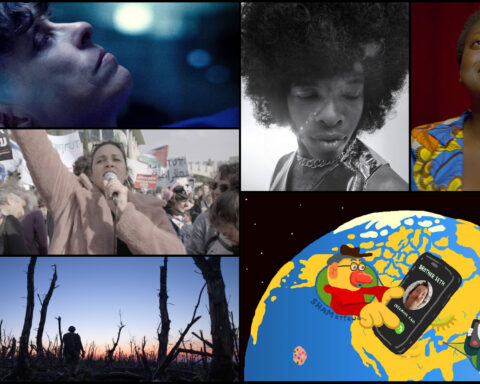There won’t be any star sightings this year at TIFF (Toronto International Film Festival). King Street won’t be closed for the weekend. Roy Thompson Hall isn’t going to have red carpet lineups with gawking crowds twice a night. In fact, TIFF isn’t screening films there at all.
Welcome to TIFF 2020.
We’re already into day two of the weirdest TIFF of them all. Yes, there will be some fascinating new films—50 features, down from 200 or more—and an industry conference is taking place. The wise heads at TIFF have made sure that business will be conducted and ardent filmgoers will be satisfied—somewhat. By all accounts, the digital technology is fully operational and TIFF is running well, technically. But there’s no doubt that COVID has socked Toronto’s favourite festival in the jaw. They’re back off the mat for this year though, and the good news is that their programming for the public and the industry has gotten off to a fine start.
It’s fascinating to watch the machinations of film festivals as they attempt to deal with the pandemic in new, and hopefully profitable, ways. Unlike Venice, which is showing films in cinemas with audiences seated at appropriate social distances from each other, TIFF is taking a multifaceted approach. Toronto’s festival, which started yesterday and goes through September 20, is showing films for a limited number of aficionados at Bell Lightbox, two drive-ins and an open-air cinema as well as online at Bell Digital Cinema.
There will also be a series of digital talks, mainly for the industry, and in-person introductions at Bell Lightbox. While Toronto is unlikely to see any foreign visitors, anyone in Canada will be able to access the online screenings during the festival. Audiences outside of the country are being geo-blocked.
TIFF’s strategy seems quintessentially Canadian. It’s a series of compromises, which should placate the festival’s core audience and industry leaders while not really satisfying anyone. In a surprising move, TIFF has also reduced the number of its films from 250 to 50 plus a few shorts programs. It’s not clear why the festival decide on such a radical reduction but it does allow filmgoers and media to focus on what has been selected for TIFF 2020.
Audiences interested in purchasing tickets to live cinema events at Bell Lightbox should write to tiff.net and the rest can go online to TIFF Account Manager (through Ticketmaster) while those wanting digital tix should use digital.tiff.net
So what’s on at TIFF 2020? With the international stardust swept from our eyes, it’s possible to see that Canada has star power of its own. This is the year for Michelle Latimer to occupy the centre stage that has been due her for years. To note that she’s Indigenous and a woman is fundamental to who Latimer is, but it doesn’t in any way limit her talents or visual and narrative abilities. Over the years, she has shown her prowess as an actor on stage and TV, writer, filmmaker and curator.
Most notably, in 2016, she directed Rise, a hard-hitting documentary series for Viceland, on the stunning populist protests made by the native Dakota Sioux tribe against the occupation of their reservation for the purpose of laying an oil pipeline. Though Trump’s forces—and make no mistake, he was deeply involved in the crisis—have laid the line, the tribe is still fighting the good fight to stop the ruinous ecological damage being wrought on their land.
Latimer has followed up this series with Inconvenient Indian, Latimer’s second documentary feature. It is an essay film about Indigenous and Inuit culture and how it’s been subverted over the years by the white majority. Latimer’s work is based on the writings of award-winning author Thomas King, who participates in the film as an actor and interpreter of a vision of the land and the people who are the original inhabitants of North America. Through art, film, story-telling and historical accounts, the sweeping film gives the viewer the sense of past injustices while offering hope for the future.
I’ve been immersed in documentaries in the lead-up to TIFF and though I can’t fully review anything yet, it’s certainly Ok to say that everything I’ve seen has been worthwhile.
The New Corporation: The Unfortunately Necessary Sequel (Joel Bakan, & Jennifer Abbott, dirs.) is an update on the classic doc, which proposed that a corporation, as a legal “human entity,” was, by psychological standards, a psychopath. Nothing in the new film is quite as shocking as that revelation but the doc offers a more than worthy dissection of the efforts by corporations to look like good citizens while making their bottom lines more robust than ever.
76 Days (Hao Wu, Anonymous, Weixi Chen, dirs.) is a brilliantly constructed piece that plunges the viewer into a hospital in Wuhan, China, where the first wave of COVID-19 hit the world. A true cinema verité, the film shows the terrifying reality of what is was like to deal with the reality of people living and dying during a pandemic. Brilliantly edited, the pacing of the film is superb, starting with the frantic movements of patients and staff in January as all try to cope with the disease to a gradual lengthening of time as more people survive and characters are allowed to emerge. This is one of the first films on COVID and it may turn out to be one of the best.
MLK/FBI (Sam Pollard, dir.) is a stark historical film focusing on the Federal Bureau of Investigation’s examination of Martin Luther King’s private life in the Sixties, when he emerged as the most influential Black leader in the Civil Rights movement. Like 76 Days, this film is superbly edited, constructing the story of FBI leader J. Edgar Hoover’s obsessive attempts to crush or at least control King. Sam Pollard brings the past to life in this political and emotional film.
Thanks to the relative scarcity of films at TIFF 2020, it will be possible for online viewers, in particular, to see more than 50 percent of the documentaries curated for the festival. You can see such docs as I Am Greta (about Ms. Thunberg), Enemies of the State (a stranger-than-fiction look at computer hacker who worked with Julian Assange and once sought asylum in Canada), and No Ordinary Man (about trans-pianist Billy Tipton) as well as new docs by acclaimed auteurs Frederic Wiseman (City Hall) and Werner Herzog (Fireball). This will be a fine TIFF for people who love docs.













